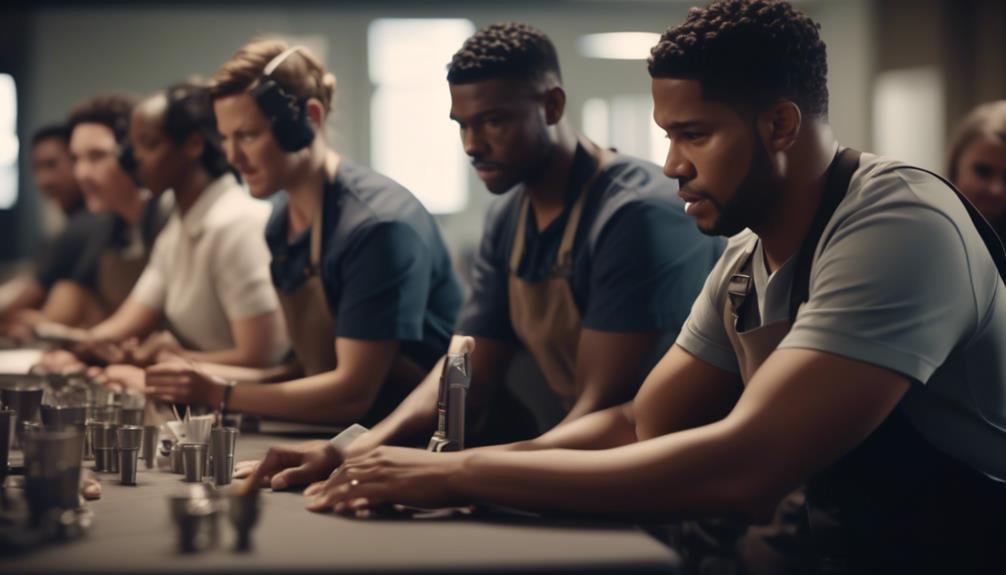Hospitality Training: Designing Effective Programs
When it comes to hospitality training, there are several crucial aspects to consider. One of these is identifying the needs of your staff. Understanding what specific skills and knowledge they require in order to excel in their roles is essential for designing effective training programs.
Another important factor to consider is understanding the challenges of the industry. The hospitality industry is fast-paced and constantly evolving, so it's crucial to stay up-to-date with the latest trends and developments. By understanding these challenges, you can tailor your training programs to address them and ensure that your staff is prepared to handle them.
Developing engaging learning experiences is also key. Traditional training methods can often be dull and ineffective, so it's important to incorporate interactive and hands-on activities into your programs. This not only helps to keep your staff engaged and motivated, but it also enhances their learning experience and retention of knowledge.
The effectiveness of your training programs can significantly impact the guest experience and ultimately your business's success. By providing your staff with the necessary skills and knowledge, they will be better equipped to exceed guest expectations and deliver exceptional service.
But how can you measure the true effectiveness of these programs? It's important to establish clear goals and objectives for your training programs and regularly evaluate their impact. This can be done through feedback surveys, performance evaluations, and tracking key performance indicators.
In conclusion, designing and implementing effective hospitality training programs is essential for elevating the guest experience and driving business growth. By identifying staff needs, understanding industry challenges, and developing engaging learning experiences, you can ensure that your team is equipped with the skills and knowledge to exceed guest expectations. Regularly evaluating the effectiveness of your programs will help you make improvements and ensure that your training efforts are paying off.
Key Takeaways
- Identifying training needs through observation, feedback, and competency assessments is crucial for designing effective hospitality training programs.
- Developing engaging learning experiences with interactive activities, simulations, brainstorming sessions, and multimedia content can enhance learning retention and promote teamwork.
- Measuring training program effectiveness through clear goals, feedback surveys, performance evaluations, and tracking key performance indicators is essential for continuous improvement.
- Tailoring programs for workforce development by customizing training content, addressing specific challenges, and focusing on targeted skill development can improve performance, job satisfaction, and overall customer experiences.
Identifying Training Needs
To effectively determine the training needs of your hospitality staff, observe their performance and gather feedback from both employees and customers. Assessing competencies is crucial in identifying areas where your staff may require additional training.
By observing their day-to-day tasks, you can pinpoint specific areas where they may need improvement. Additionally, gathering feedback from employees can provide valuable insights into their own self-assessment of their skills and knowledge. This can help in understanding their perspectives on where they feel they may need further development.
On the other hand, obtaining feedback from customers can shed light on the areas where the staff may not be meeting the expectations of the guests. This type of training assessment is invaluable for understanding the gaps in the current competencies of your hospitality staff.
Understanding Hospitality Industry Challenges
Observing your hospitality staff's performance and gathering feedback from employees and customers provides valuable insights into the challenges faced by the industry. In the constantly evolving hospitality sector, staying abreast of industry advancements is crucial.
One of the major challenges is keeping up with the rapid technological changes that impact customer satisfaction. Meeting the increasing demand for personalized experiences while maintaining operational efficiency is another hurdle. The industry also faces the constant challenge of recruiting and retaining top talent, especially in the face of competition from other service sectors.
Balancing the need to upgrade infrastructure and amenities with sustainability initiatives presents a unique challenge. Furthermore, the pressure to adapt to changing consumer preferences and behaviors adds complexity to the industry landscape.
Understanding and addressing these challenges is essential for hospitality businesses to thrive. By acknowledging these obstacles, you can better strategize training programs to equip your staff with the skills and knowledge needed to navigate the dynamic hospitality landscape and deliver exceptional guest experiences.
Developing Engaging Learning Experiences

To create engaging learning experiences, incorporate interactive training activities and captivating multimedia content.
These elements can help learners stay focused and actively participate in the training program.
Interactive Training Activities
Engaging learning experiences can be fostered through the incorporation of interactive training activities that encourage participation and collaboration among participants.
Role playing simulations provide a hands-on approach for employees to practice real-life scenarios, enhancing their ability to handle various situations effectively. This interactive activity allows participants to step into different roles, gaining valuable insights and skills in a dynamic setting.
Additionally, group brainstorming sessions spark creativity and critical thinking as individuals contribute diverse ideas and perspectives. By engaging in collaborative problem-solving, employees develop a deeper understanding of hospitality challenges and solutions.
These activities not only make learning more enjoyable but also promote active engagement, leading to a more effective and impactful training experience.
Incorporating interactive training activities into hospitality programs can significantly enhance participant learning and skill development.
Captivating Multimedia Content
Incorporating captivating multimedia content into hospitality training programs can further elevate the engaging learning experiences for participants. This can be achieved by building on the interactive training activities that encourage active participation and collaboration. Interactive presentations offer a dynamic way to immerse participants in the learning process. This allows them to interact with the content and apply their knowledge in real-time scenarios.
Visual storytelling is another effective method that can be used through the use of videos, infographics, and animations. These multimedia elements can captivate learners' attention and convey complex information in a compelling manner. Incorporating interactive quizzes or simulations into the training curriculum can also enhance the learning experience. This approach allows participants to engage with the material in a more immersive and memorable way.
The integration of multimedia elements not only enhances knowledge retention but also creates a stimulating and enjoyable learning environment. This fosters active participation and encourages participants to apply their knowledge effectively.
Implementing Interactive Training Methods
Interactive training methods can significantly enhance the effectiveness of hospitality training programs by actively engaging participants and promoting experiential learning. By incorporating role-playing exercises and virtual simulations, trainees can immerse themselves in realistic scenarios, allowing them to practice their skills in a safe and controlled environment. Role-playing exercises enable participants to take on different roles, such as a guest or a staff member, and interact with each other to simulate real-life hospitality situations. Virtual simulations provide a similar experience in a digital format, allowing trainees to navigate through lifelike scenarios and make decisions as they would in a real hospitality setting. These interactive methods not only enhance learning retention but also foster teamwork, communication, and problem-solving skills. Below is a table showcasing the benefits of implementing interactive training methods in hospitality programs.
| Benefits of Interactive Training Methods | ||
|---|---|---|
| Actively engages participants | Promotes experiential learning | Enhances learning retention |
| Fosters teamwork and communication | Develops problem-solving skills | Simulates real-life hospitality situations |
| Provides a safe learning environment | Encourages active participation | Improves decision-making abilities |
Tailoring Programs for Workforce Development

You can tailor your hospitality training programs to address specific needs and challenges within your workforce.
By customizing training content, you can ensure that your employees receive targeted skill development that directly impacts their performance.
This approach can lead to improved job satisfaction, higher productivity, and better overall customer experiences.
Customized Training Content
Tailoring training programs to meet the specific needs of your workforce is essential for maximizing skill development and overall performance. By taking a personalized approach and incorporating industry-specific content, you can ensure that your hospitality training programs are effective and impactful. Customizing training content allows you to address the unique challenges and requirements of your staff, leading to better engagement and retention of learning. Here's a breakdown of how customized training content can benefit your workforce:
| Customized Training Content Benefits |
|---|
| 1. Enhanced Relevance |
| 2. Increased Engagement |
| 3. Improved Retention |
With a focus on customized training content, you can elevate the skill set of your workforce and drive superior performance in the hospitality industry.
Targeted Skill Development
By customizing training content to address the unique challenges and requirements of your staff, you can effectively tailor programs for targeted skill development in the workforce.
Skill assessment plays a crucial role in identifying the specific areas where employees need improvement. This can be achieved through various methods such as performance evaluations, self-assessments, and supervisor feedback.
Once the skill gaps are identified, training programs can be designed to focus on these areas, ensuring that the content is directly relevant to the needs of the employees.
Performance improvement should be a central focus of these targeted programs, with clear objectives and benchmarks to measure progress.
Enhancing Guest Experience Through Training
To enhance the guest experience, hospitality training programs focus on equipping staff with the skills and knowledge necessary to deliver exceptional service. Improving communication and customer satisfaction are key goals of these programs. By enhancing the guest experience through training, staff members can create a positive and memorable interaction for each guest. This not only leads to increased customer satisfaction but also encourages repeat visits and positive word-of-mouth recommendations.
| Skills Training | Customer Interaction | Problem-Solving |
|---|---|---|
| Communication | Greeting guests | Handling issues |
| Empathy | Taking orders | Resolving complaints |
| Product knowledge | Anticipating needs | Thinking on feet |
| Teamwork | Upselling | Remaining calm |
| Adaptability | Handling feedback | Finding solutions |
Measuring Effectiveness of Training Programs

Measuring the effectiveness of hospitality training programs is essential for assessing the impact of the training on staff performance and guest satisfaction. It's crucial to establish clear metrics for measuring progress and evaluating the training impact. One way to measure progress is through pre- and post-training assessments to gauge the knowledge and skill improvement of staff members.
Additionally, tracking key performance indicators such as customer satisfaction scores, repeat business, and positive reviews can provide insights into the training's impact on guest satisfaction.
Another effective method for measuring the effectiveness of training programs is conducting follow-up surveys with both employees and guests. This feedback can offer valuable insights into the practical application of the training and its influence on the overall guest experience. By gathering data on staff confidence levels, job satisfaction, and their ability to apply the training concepts in their roles, hospitality managers can gain a comprehensive understanding of the training's effectiveness.
Ultimately, measuring the effectiveness of hospitality training programs allows for continuous improvement and refinement, ensuring that the training aligns with the organization's goals and contributes to a superior guest experience.
Conclusion
You've learned how to design effective hospitality training programs that address industry challenges and enhance guest experience.
Did you know that 76% of guests are willing to pay more for a superior customer experience?
By implementing interactive and engaging training methods, you can ensure your staff is equipped to provide top-notch service, leading to higher customer satisfaction and increased revenue.
Keep investing in your training programs to see lasting results in your hospitality business.







